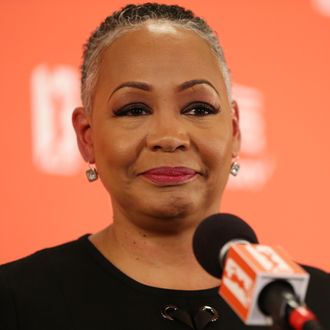
Leaders of the the Time’s Up organization held a conference call today to give a state of the union on the group as it approaches one year since launching. Led by CEO Lisa Borders, the women talked about the ongoing mission of the collective, and of course, the effects of Justice Brett Kavanaugh’s confirmation to the Supreme Court on the fight for equity in the workplace and protections for victims of assault and harassment. “We want to say in this post-Kavanaugh moment, we’re not stopping,” said one member. “We’re fortifying. We’re institutionalizing, and we will not rest until we have achieved safe, fair, and dignified work for women everywhere.”
“We know that people were deeply traumatized by what happened,” another member added. “That people were really disappointed is a true understatement. Some people were absolutely horrified at what happened. I think what we saw [during the hearing] perhaps was perverse fuel for the rocket ship here we are calling Time’s Up. So the sensitivity has certainly been raised, which is really helpful, and we expect that the interest will continue to climb as it already has been. But it will accelerate is what I expect will happen.”
Borders said that about 3,500 people have contacted Time’s Up since January seeking legal assistance for harassment, and in about 50 cases they were able to provide financial assistance to those in need. Members thanked the many women and “good, enlightened men” who have assisted the organization over the past ten months, and said that going forward they are focused on getting more women elected to public office, and developing systems for both companies and the U.S. government that can be used to more legitimately process claims of misconduct.
And as for the thorny question of when the accused should be “allowed” to return to the public eye, the group addressed that too. “We at Time’s Up are not trying to replace the patriarchy with the matriarchy. This is about a world of shared and balanced power. This is not about punishing a person. This is about eliminating the bad behavior,” said one of the members. “What we’ve said among ourselves is that it’s not for any one organization to rehabilitate a person, to grant forgiveness. The accused has to make amends with their survivor. But common understanding, expressing real change, understanding the systemic culture that these men have not just perpetrated but lived in and supported, that hasn’t happened very often over this last year among people who have been accused. And the ones who start to do that are going to be the ones who rehabilitate themselves the quickest.”


